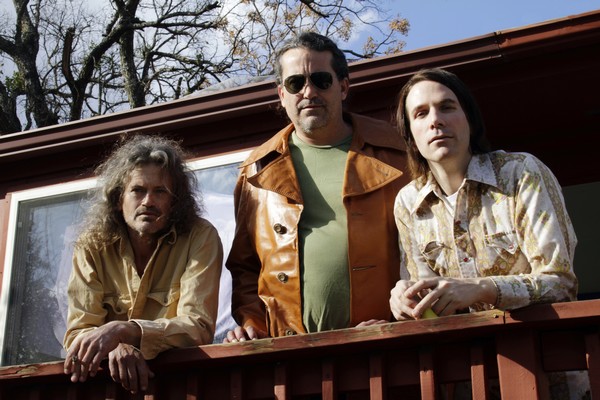“I’ve always tried to avoid involving my feelings in my songs – that’s part of my approach,” Kirkwood says. “I’ve always seen lyrics as a bit more abstract. There’s no satire, it’s not allegorical if I can help it. I just want to find something that works.”
The Kirkwood brothers started playing together in their teenage years. By 1978, Cris had swapped his banjo for a bass, and the pair had immersed themselves in the hardcore punk aesthetic that would characterise Meat Puppets’ initial performances and recordings.
By the time Meat Puppets recorded Meat Puppets – still regarded as the band’s seminal recording – the Kirkwood brothers and drummer, high school friend Derek Bolstrom, had made a quantum leap from hardcore, blending the band’s punk origins with a twisted chemical country inflection that would subsequently be described as ‘cow punk’.
“We were never a straight hardcore band; we were always a bit too idiosyncratic for the straight up hardcore crowd. We played with bands like Black Flag, Dead Kennedys and Suicidal Tendencies, and the crowd would just hate us – they’d leave,” Kirkwood says. “When we started playing slow, the crowd would just run away – which was good, because we didn’t get as much spit on us.”
Like many of its contemporaries, Meat Puppets indulged the chemical excesses of the rock’n’roll lifestyle: the Kirkwood brothers moved on from weed and booze to coke, ecstasy, LSD and eventually heroin. “I don’t know if drugs helped the creative process,” Kirkwood muses, “but they were certainly an influence on the music that we were creating at the time…But when I hear that music it sounds pretty crazy, so we must have been pretty messed up.”
While Curt Kirkwood quit heroin relatively early on, Cris Kirkwood fell deeper and deeper into a narcotic funk. By the mid-‘90s Cris was a full-blown junkie, rarely leaving his house except to buy drugs. Cris’s wife, French Canadian writer Michelle Tardiff, was an equally enthusiastic participant in Cris’ dysfunctional narcotic existence. In 1998, Tardiff – after a string of arrests and unsuccessful stints in drug rehabilitation clinics – died from an overdose at the couple’s home. Not long after, a friend of Cris’ overdosed deliberately on pills, also at Cris’ house.
Perversely, Cris’ descent into drug hell over the preceding decade had coincided with an increase in Meat Puppets’ popularity and commercial success. Having been largely a cult act until the early ‘90s, in 1993 Kurt Cobain invited the Kirkwood brothers to join Nirvana onstage to play a few Meat Puppets tracks at Nirvana’s now legendary MTV Unplugged session.
“After that we started doing bigger tours and we got videos on MTV. You start getting more money and you start thinking there’s something to that, but there’s not – you can’t do much with it,” Kirkwood says. “For me I don’t think it was making anything easier except to raise my kids. But I don’t think it was that good for Cris.”
By the late ‘90s, Cris’ narcotic troubles had effectively caused Meat Puppets to go into long-term hiatus. In 2003 Cris’ life reached rock bottom when he was arrested after attacking a security guard at a downtown post office. Sentenced to jail, Cris quit drugs and straightened out. Curt is matter of fact about his brother’s problems, and his eventual recovery – though that was an attitude that was born out of necessity, and not indifference.
“I had had to learn to distance myself from Cris’ situation because if you’re too sentimental, then a junkie can just feed on that,” Kirkwood says. “But he was still my brother, and his life was going haywire.”
Meat Puppets – minus Bolstrom, who preferred to stay with his settled professional and domestic life – reconvened in 2006. Meat Puppets have gone onto to release four albums in the past six years, including 2013’s Rat Farm – an album that Kirkwood has described as “full blown folk music”.
“To me, folk music is just really simple peasant music – it’s cryptic, ridiculous simple music,” Kirkwood says.
BY PATRICK EMERY

